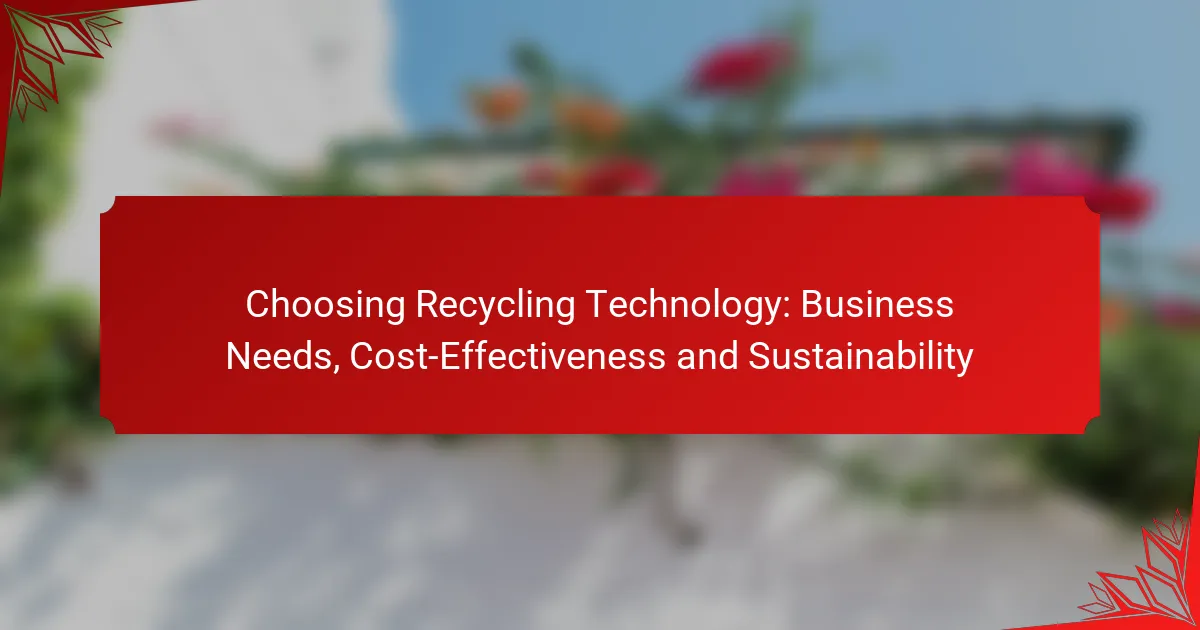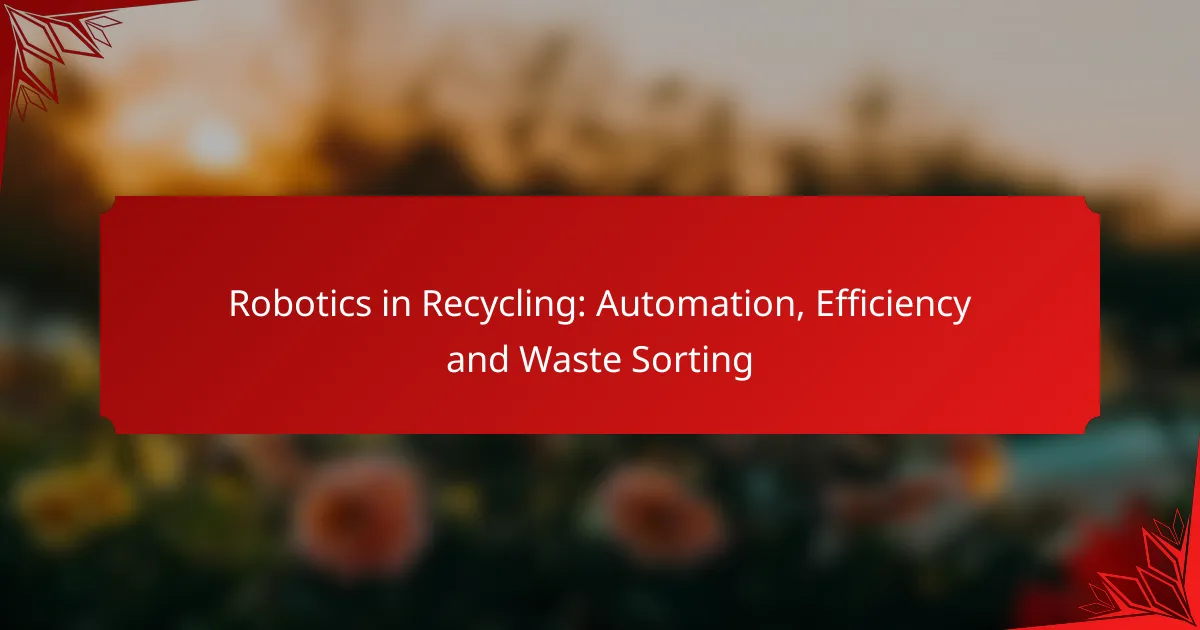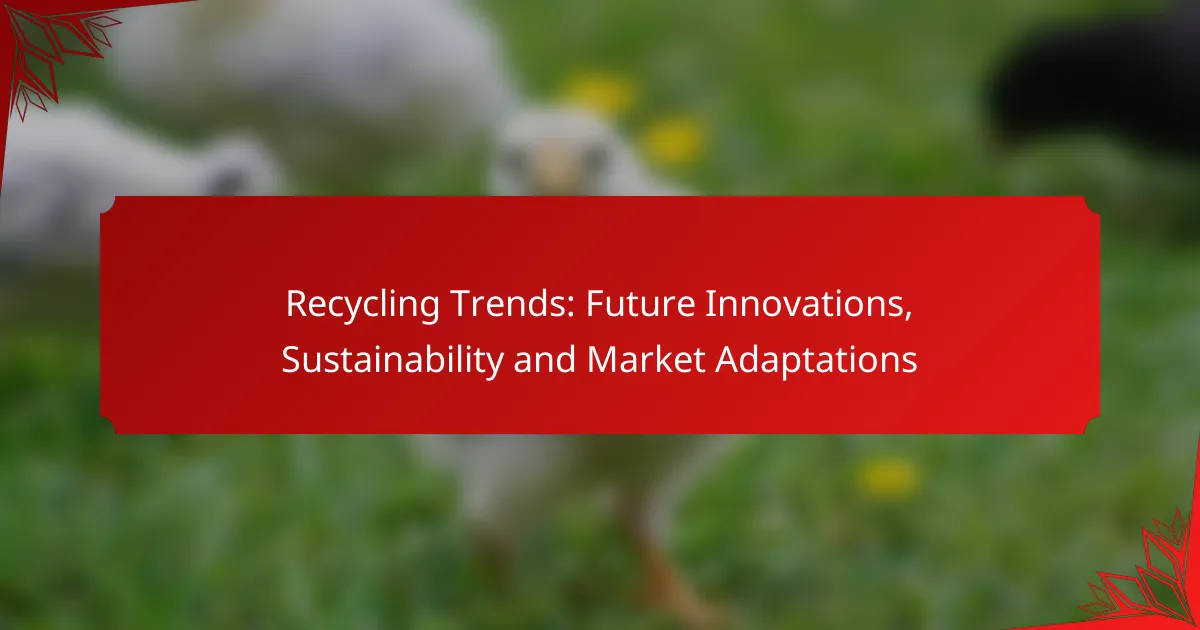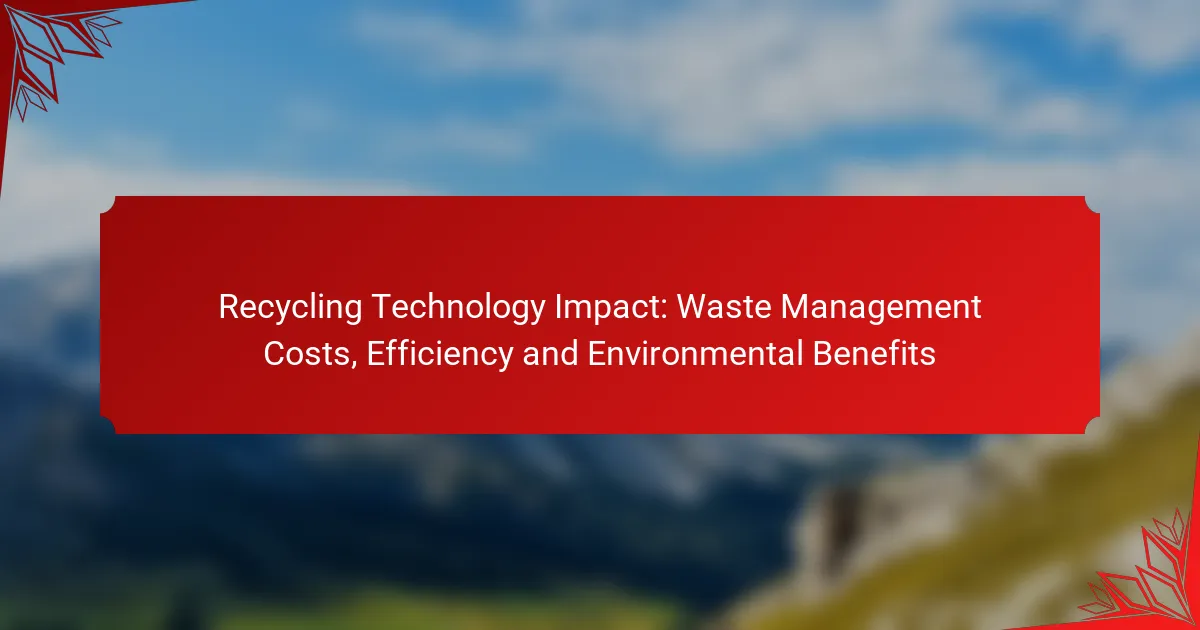Choosing the right recycling technology is crucial for businesses aiming to enhance efficiency, reduce costs, and promote sustainability. By evaluating options such as single-stream recycling and automated sorting, companies can align their operations with environmental goals while also considering the cost-effectiveness and potential return on investment of these technologies.
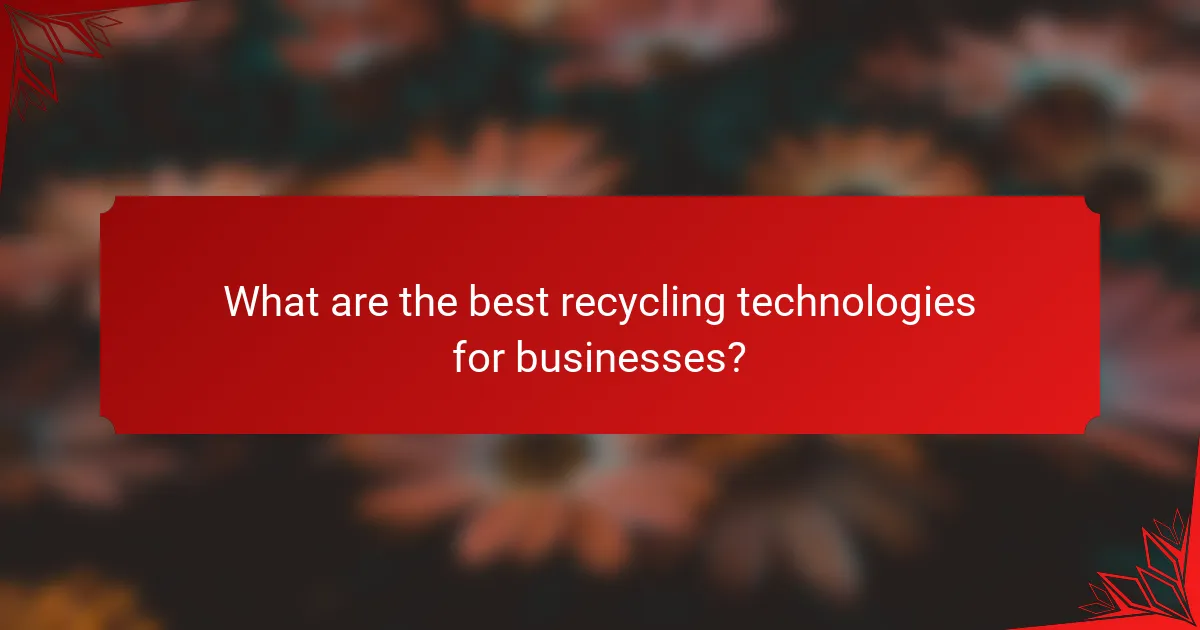
What are the best recycling technologies for businesses?
The best recycling technologies for businesses include systems that enhance efficiency, reduce costs, and promote sustainability. Key options to consider are single-stream recycling, automated sorting, advanced composting, waste-to-energy conversion, and mobile recycling units.
Single-stream recycling systems
Single-stream recycling systems allow businesses to collect all recyclable materials in one bin, simplifying the process for employees and customers. This method increases participation rates and can lead to higher recycling volumes.
However, it can result in contamination if non-recyclables are included. Businesses should educate staff on acceptable materials and consider regular audits to maintain quality.
Automated sorting technologies
Automated sorting technologies utilize advanced machinery to separate recyclables from waste efficiently. These systems often employ sensors and AI to identify materials, significantly reducing labor costs and increasing processing speed.
Investing in automated sorting can be beneficial for larger operations, but upfront costs can be high. Businesses should evaluate the potential return on investment based on their waste volume and recycling goals.
Advanced composting solutions
Advanced composting solutions enable businesses to convert organic waste into valuable compost. These systems can be either aerobic or anaerobic, depending on the desired end product and space availability.
Implementing composting can reduce landfill waste and lower disposal costs. Companies should assess their waste composition and consider partnering with local composting facilities for effective processing.
Waste-to-energy conversion
Waste-to-energy conversion technologies transform non-recyclable waste into usable energy, such as electricity or heat. This process can significantly reduce the volume of waste sent to landfills while generating renewable energy.
However, businesses must consider regulatory requirements and community acceptance, as these facilities can face opposition. Evaluating local energy markets and potential partnerships is crucial for successful implementation.
Mobile recycling units
Mobile recycling units provide on-site recycling solutions, making it easier for businesses to manage waste at events or remote locations. These units can be tailored to specific needs and can handle various materials, from plastics to metals.
While they offer flexibility, businesses should assess the cost-effectiveness and logistical considerations of deploying mobile units. Proper planning and community engagement can enhance their effectiveness and acceptance.
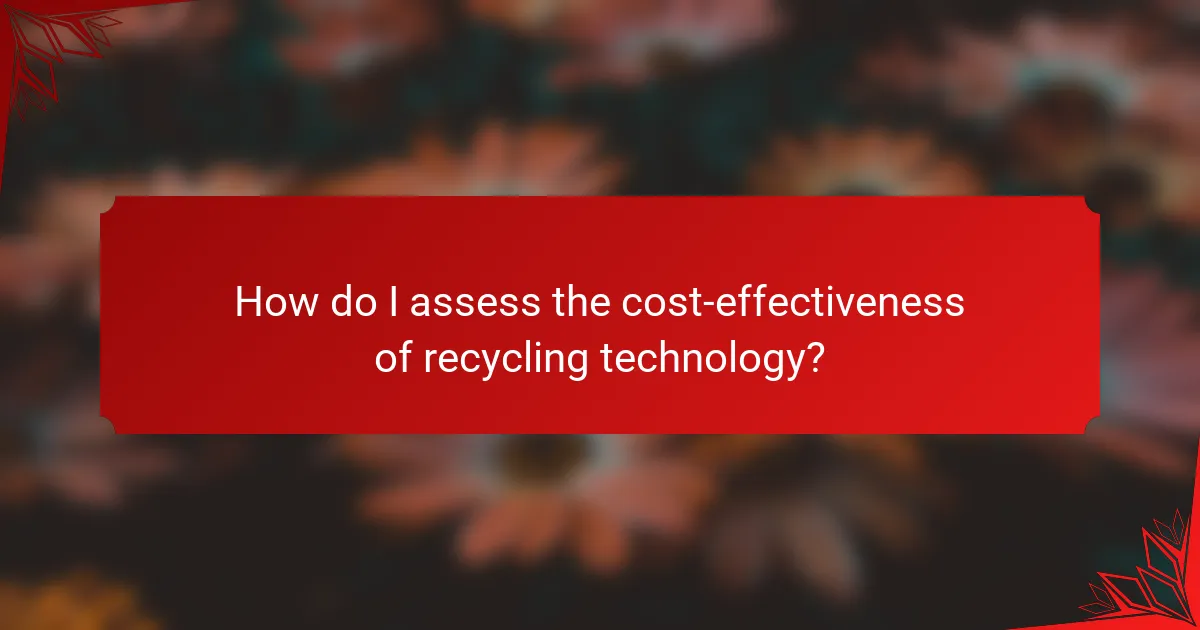
How do I assess the cost-effectiveness of recycling technology?
To assess the cost-effectiveness of recycling technology, evaluate the initial investment, ongoing operational costs, and potential return on investment (ROI). This analysis helps determine if the technology aligns with your business needs and sustainability goals.
Initial investment analysis
Initial investment analysis involves calculating the upfront costs associated with purchasing and installing recycling technology. This may include equipment costs, installation fees, and any necessary facility modifications. For example, small-scale systems can range from a few thousand to tens of thousands of USD, depending on capacity and technology type.
Consider financing options, such as loans or grants, that may be available for businesses investing in sustainable practices. Research local incentives that could offset initial expenses, as many regions offer support for green technology investments.
Operational cost evaluation
Operational cost evaluation focuses on the ongoing expenses related to running the recycling technology. This includes energy consumption, maintenance, labor, and material handling costs. Regular maintenance is crucial, as neglect can lead to higher costs and reduced efficiency over time.
Benchmark your operational costs against industry standards to identify areas for improvement. For instance, energy-efficient technologies may have a higher upfront cost but can significantly reduce long-term operational expenses.
Return on investment (ROI) projections
ROI projections estimate the financial returns generated by the recycling technology compared to its costs. Calculate ROI by comparing the net profit from recycled materials to the total investment over a specific period. A positive ROI indicates that the technology is financially viable.
Consider factors such as market demand for recycled materials and potential cost savings from reduced waste disposal fees. Aim for an ROI that meets or exceeds your business’s financial benchmarks, typically within a few years of implementation.
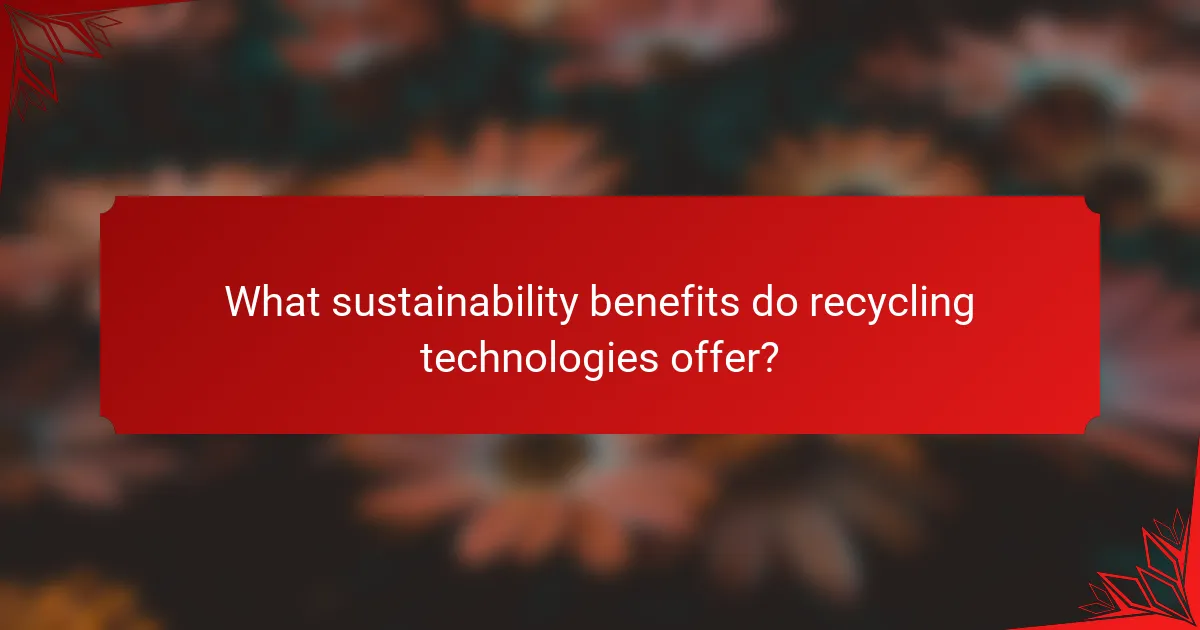
What sustainability benefits do recycling technologies offer?
Recycling technologies provide significant sustainability benefits by minimizing waste, reducing carbon emissions, and conserving natural resources. These advantages not only support environmental health but also contribute to economic efficiency and resource management.
Reduction of landfill waste
Recycling technologies significantly decrease the volume of waste sent to landfills. By processing materials like plastics, metals, and paper, these technologies transform waste into reusable resources, thereby extending the lifespan of existing landfills. For instance, recycling one ton of paper can save over 17 trees and reduce landfill use by about 3.3 cubic yards.
Businesses should consider implementing recycling programs that target specific materials to maximize waste reduction. Regular audits can help identify the most common waste types and optimize recycling efforts accordingly.
Lower carbon footprint
Utilizing recycling technologies can lead to a lower carbon footprint by reducing the energy required for producing new materials. For example, recycling aluminum saves up to 95% of the energy needed to create new aluminum from bauxite ore. This energy savings translates into fewer greenhouse gas emissions.
To effectively lower carbon emissions, companies should evaluate their recycling processes and aim to enhance efficiency. Investing in advanced recycling technologies can further minimize energy consumption and emissions associated with production.
Conservation of natural resources
Recycling technologies play a crucial role in conserving natural resources by reusing materials that would otherwise be extracted from the environment. This practice helps protect ecosystems and reduces the depletion of finite resources. For example, recycling one ton of glass can save over a ton of raw materials needed for new glass production.
Businesses can contribute to resource conservation by establishing partnerships with local recycling facilities and promoting a circular economy. Encouraging employees to participate in recycling initiatives can also foster a culture of sustainability within the organization.
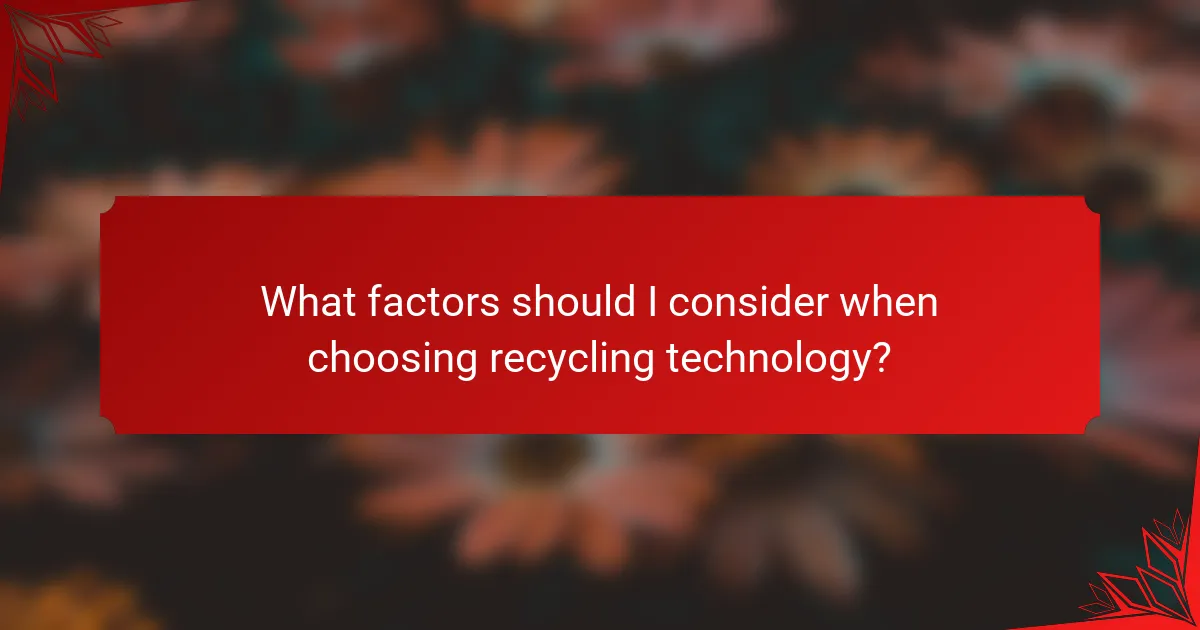
What factors should I consider when choosing recycling technology?
When selecting recycling technology, consider business size, material types, and regulatory compliance. These factors significantly impact efficiency, cost-effectiveness, and sustainability of your recycling operations.
Business size and type
Your business size and type influence the scale and complexity of recycling technology needed. Smaller businesses may benefit from compact, modular systems that require less upfront investment, while larger enterprises might opt for industrial-scale solutions that handle higher volumes efficiently.
Consider the specific industry you operate in, as different sectors have unique recycling needs. For instance, a manufacturing firm may require heavy-duty machinery for metal recycling, while a retail business might focus on plastic and cardboard processing.
Material types processed
The types of materials your business recycles dictate the technology you should choose. Different materials, such as plastics, metals, and paper, require tailored processing methods and equipment. Understanding the properties of these materials will help you select the right technology.
For example, if your focus is on mixed plastics, you may need advanced sorting technology to separate various types effectively. Conversely, if you primarily recycle metals, investing in shredders and magnetic separators could be more beneficial.
Regulatory compliance requirements
Compliance with local and national regulations is crucial when selecting recycling technology. Different regions have specific laws governing waste management and recycling practices, which can affect your operational choices.
Ensure that the technology you choose meets these regulatory standards to avoid fines and ensure safe operations. For instance, in the EU, the Waste Electrical and Electronic Equipment (WEEE) Directive sets requirements for recycling electronic waste, which may necessitate specialized equipment.
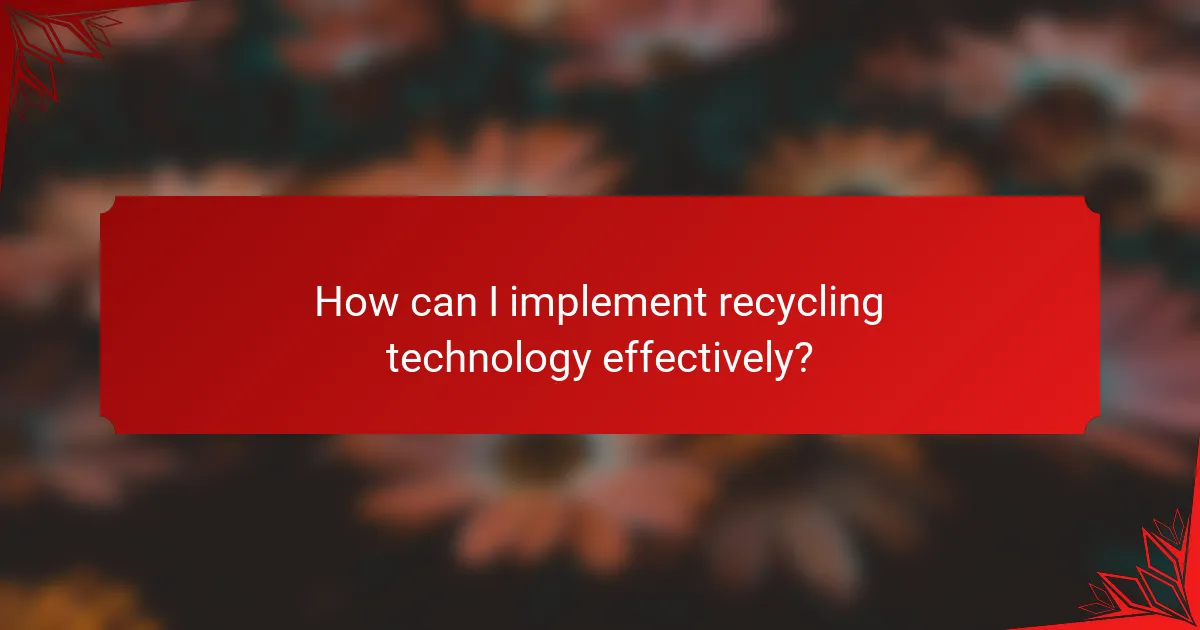
How can I implement recycling technology effectively?
Implementing recycling technology effectively involves understanding your business needs, assessing cost-effectiveness, and ensuring sustainability. A strategic approach includes staff training, forming partnerships with recycling firms, and establishing monitoring systems to track progress.
Staff training programs
Effective staff training programs are essential for successful recycling technology implementation. Training should cover the importance of recycling, proper sorting techniques, and the use of any new technology. Regular workshops and refresher courses can help maintain awareness and compliance.
Consider incorporating hands-on training sessions, where employees can practice sorting and using recycling equipment. This practical approach can enhance understanding and retention, leading to better recycling outcomes.
Partnerships with recycling firms
Forming partnerships with established recycling firms can enhance your recycling efforts. These firms often have the expertise and resources to handle various materials efficiently, ensuring that your recycling processes are effective and compliant with local regulations.
When selecting a recycling partner, evaluate their track record, the range of materials they accept, and their commitment to sustainability. Establish clear communication channels to facilitate smooth operations and regular feedback on recycling performance.
Monitoring and reporting systems
Implementing monitoring and reporting systems is crucial for tracking the effectiveness of your recycling technology. These systems can help you measure key metrics such as the volume of materials recycled and the reduction in waste sent to landfills.
Consider using software solutions that provide real-time data and analytics. Regularly reviewing this data allows you to identify areas for improvement and adjust your strategies accordingly. Establish a reporting schedule to share progress with stakeholders and maintain accountability.
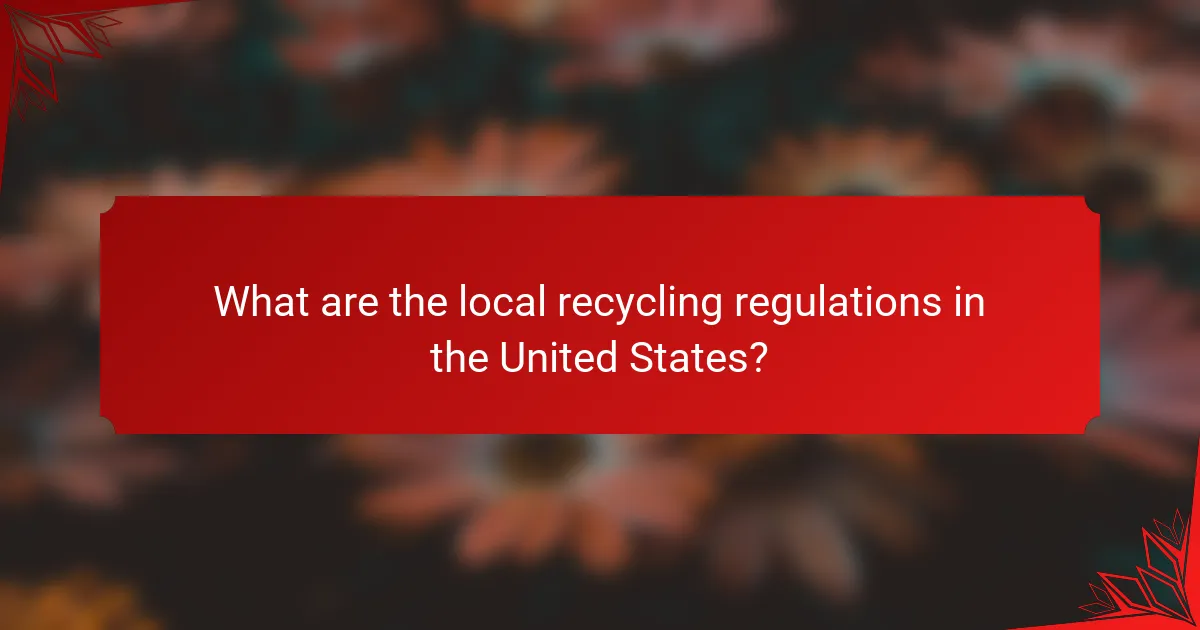
What are the local recycling regulations in the United States?
In the United States, recycling regulations vary significantly by state and locality, with each jurisdiction establishing its own rules regarding what materials can be recycled, how they should be processed, and the responsibilities of businesses and consumers. Understanding these regulations is crucial for companies looking to implement effective recycling technologies and practices.
State-specific recycling laws
Each state has unique recycling laws that dictate how materials must be handled. For instance, California has stringent regulations requiring businesses to recycle a certain percentage of waste, while states like Texas may have more lenient guidelines. Companies should familiarize themselves with their specific state laws to ensure compliance and avoid potential fines.
Additionally, many states have adopted extended producer responsibility (EPR) laws, which require manufacturers to take responsibility for the entire lifecycle of their products, including recycling. This can influence the choice of recycling technology, as businesses may need to invest in systems that align with these regulations.
To navigate state-specific recycling laws effectively, businesses should consider consulting local waste management authorities or legal experts. Staying informed about changes in legislation can also help companies adapt their recycling strategies and technologies accordingly.
